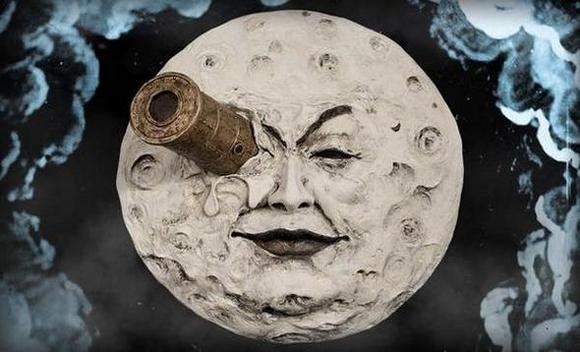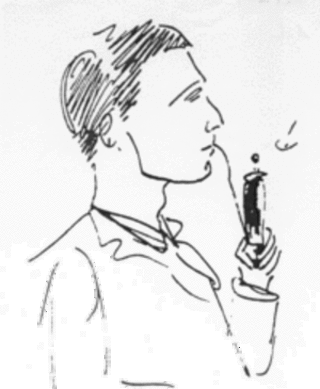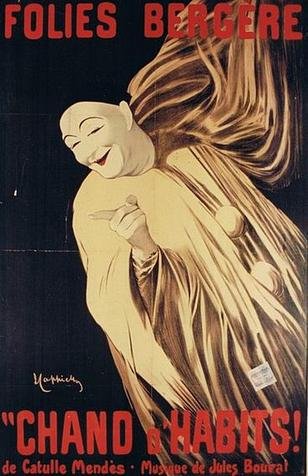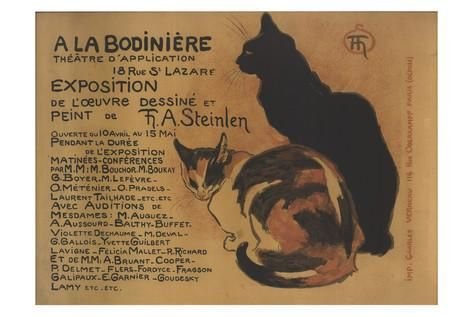
Dear readers, I continue here with the pending of the previous post with a brief visit to Laforgue's poetic work in its modern contribution.
Examples of his poems
Let's look at some fragments of his poems.
From: "Funeral march for the death of the earth (Announcement ticket)" / "Marche funèbre pour la mort de la terre (Billet de faire-part)"
Everything that gave birth to your children's passion,
All that was your slime and your brief splendor,
Oh Earth, now it's like a dream, a big dream.
But sleep, sleep eternally, it's all over.
Oh solemn retinue of the splendid suns...
Sleep forever, it's all over, you can believe
That this unheard of drama was nothing more than a nightmare
For you are but a tomb that wanders at random
[...l no name in the darkness of memory
It was a dream, oh yes, you never existed!
Everything is deserted! No witnesses see anything, nothing thinks!
There is only darkness, time and silence.
Sleep, you just dreamed, sleep forever.
The dark and pessimistic vision is shown, with the presence of irony, although with a certain tenderness, about the destiny of our planet, which it humanizes. It is somehow ahead of its time, as if it were living in ours, foreseeing its annulment or non-existence, as if everything were a dream, where the human being -his children- has ended.

"Lament of the organist of Notre-Dame de Nice" / "Complainte de l'organiste de Notre-Dame de Nice"
Here come the winter crows
They have sung between our bells,
The autumn rains are near,
No more casino groves.
Yesterday, she was even paler,
And his body trembled in a cold, dull sweat,
This church is freezing too!
Ah! Nobody here likes it more than me.
I love it! I'll get my heart right,
For such a sad smile from her!
And I will be faithful to her
Forever, in this conquering world.
The day she leaves this world..,
I will play a Miserere
So cosmically desperate
God will have to answer to me!
No, I'll stay down here alone,
All for the dearly departed,
Shaking my heart too hypertrophic
To Bach's eternal fugues.
And every year on the anniversary..,
To us, without our suspecting anything,
I'll trigger this Requiem
What I did for the death of the Earth!
Here again the death, now of the beloved woman (homologated to the Earth) dying, presented from the vision of a character between the profane and the religious (a church organist) who is lamenting. But this lament takes on an ironic character, trivialized by the way he refers to his beloved, confronting God and alluding to the serious musical pieces he will perform.

"Cigarettes" / "La cigarette"
Yes, it's a flat world, but the other world's a silly one.
I will resign myself, desperately, to my fate,
And to kill time, waiting for death,
I smoke good cigarettes in the nose of the gods.
Come on, live, fight, poor skeletons of the future
I, the blue meander that twists towards the sky...
plunges me into infinite ecstasy and puts me to sleep...
Like the dying perfumes of a thousand castanets.
And I enter paradise, blooming with clear dreams...
Where we see them blending into fantastic waltzes...
From the zeal of elephants to a chorus of mosquitoes.
And then, when I wake up thinking of my verses,
I contemplate with a heart full of sweet joy,
My dear thumb roasted like a goose leg.
Advancing in irony, with an irreverent tone, the speaker (a poet?) gloats in his leisure, in his Baudelairean "artificial paradise", with his cigar, escaping from the "flat world" and the inexorable destiny (death), not without a certain parody of himself.

From: Pierrots
IV
Make-ups of forgetfulness,
the sleeves like the willow, make them vows
too vehement to be true!
and in their white jackets they rampage
burning: "Angel!, you have understood me
in life, in death", even if they think
to make, later on, a clean slate of it...
And it's really not that they're prejudiced.
Ah, but the image of a woman
still taking seriously
in such a century, it twists them
of a laugh with ripped bells.
Don't throw the stone at them,
you guys who wear rubber bands;
do not throw the stone
these candid outcasts, the white Pierrots.
Between tenderness and biting irony, the speaker gives us a vision of this character that can condense simulation and soulless truth, laughter and the sadness of life. Perhaps the Pierrot had become for the poet the image even of himself, so he asks for some clemency towards them.

"To the memory of a dwarf cat that I had" / "A la mémoire d'une chatte naine que j'avais"
Ah, my dear cold-blooded cat, when autumn
made the children scream in their backyards,
how many days of boredom we spent together
dreaming of being locked in my room face to face.
Smoothing your tongue your silky, pink, rough hair
with a serious gesture other than games,
as you came in with a slow, quiet step
to stretch out before me in a noble pose.
And I thought, lost in your golden pupils:
-Do you suspect nothing, nothing, of the absurd balloon
that drags him with me through the Void,
no distant stars, no gods, no death?
But... those deep eyes... sometimes they terrify me.
Will he know everything? No, because it's the Sphinx.
Also in this poem we perceive the combination between affection and irony, this time from the most everyday (a little cat), which becomes the connection with the very enigma of life, everything expressed, as it has already begun to do, from a language of common communication.

From: "Great Lament of the City of Paris (Prose Blanche)" / "Grande complainte de la ville de Paris (Prose Blanche)"
Good people who listen to me, this is Paris, including Charenton, House founded in..., for rent. Medals in all exhibitions and mentions. Immortal lease. Wholesale and retail construction works of custom-made congratulations. Patented suppliers of much majesty, House recommended. Prevents hair loss. In the lotteries! Sent to the provinces. Not out of season. Subscriptions. Deposit, without guarantee of humanity, the most appropriate and second hand problems. Payment facilities, but money. Money, good people!
The expression between irony and colloquiality has a clear example here. Similar to the radio audition and/or the advertising poster (it is the penultimate decade of the 19th century), through the speaker, the poet delivers his biting, sarcastic vision of the reality that is lived in his moment.
Bibliographic references (see below information)
A very complete collection of his works in French can be found at 1 and 2, some poems in English 3 and 4, and a selection in Spanish 4) and 5
Written by @josemalavem
Click the coin below to join our Discord Server
)
There is nothing more serious than ironizing tragedies, destiny, death, and Jules Laforgue does it very well. When we ironize, we question. Irony is a resource that works if there is a reader who lives up to irony, if you understand it. When we see that the lyrical speaker questions God, his designs, we face an irreverent and daring voice. I loved that last poem. Thank you for sharing this work, @josemalavem. regards
Thanks to you, @nancybriti, for your reading and commentary. I highlighted in this work what I called "the irruption of irony", because, although we know that irony makes its entrance with modernity (it was already in the Schlegel brothers, Hugo, Baudelaire, etc.), Laforgue takes it to one of its maximum modern expressions, very close to what it will be in the 20th century. Greetings.
Excelente
Thank you, @oresteg.
Hi, @adsactly!
You just got a 0.28% upvote from SteemPlus!
To get higher upvotes, earn more SteemPlus Points (SPP). On your Steemit wallet, check your SPP balance and click on "How to earn SPP?" to find out all the ways to earn.
If you're not using SteemPlus yet, please check our last posts in here to see the many ways in which SteemPlus can improve your Steem experience on Steemit and Busy.
Congratulations @adsactly!
Your post was mentioned in the Steem Hit Parade in the following category:
Thanks to you guys, @arcange.